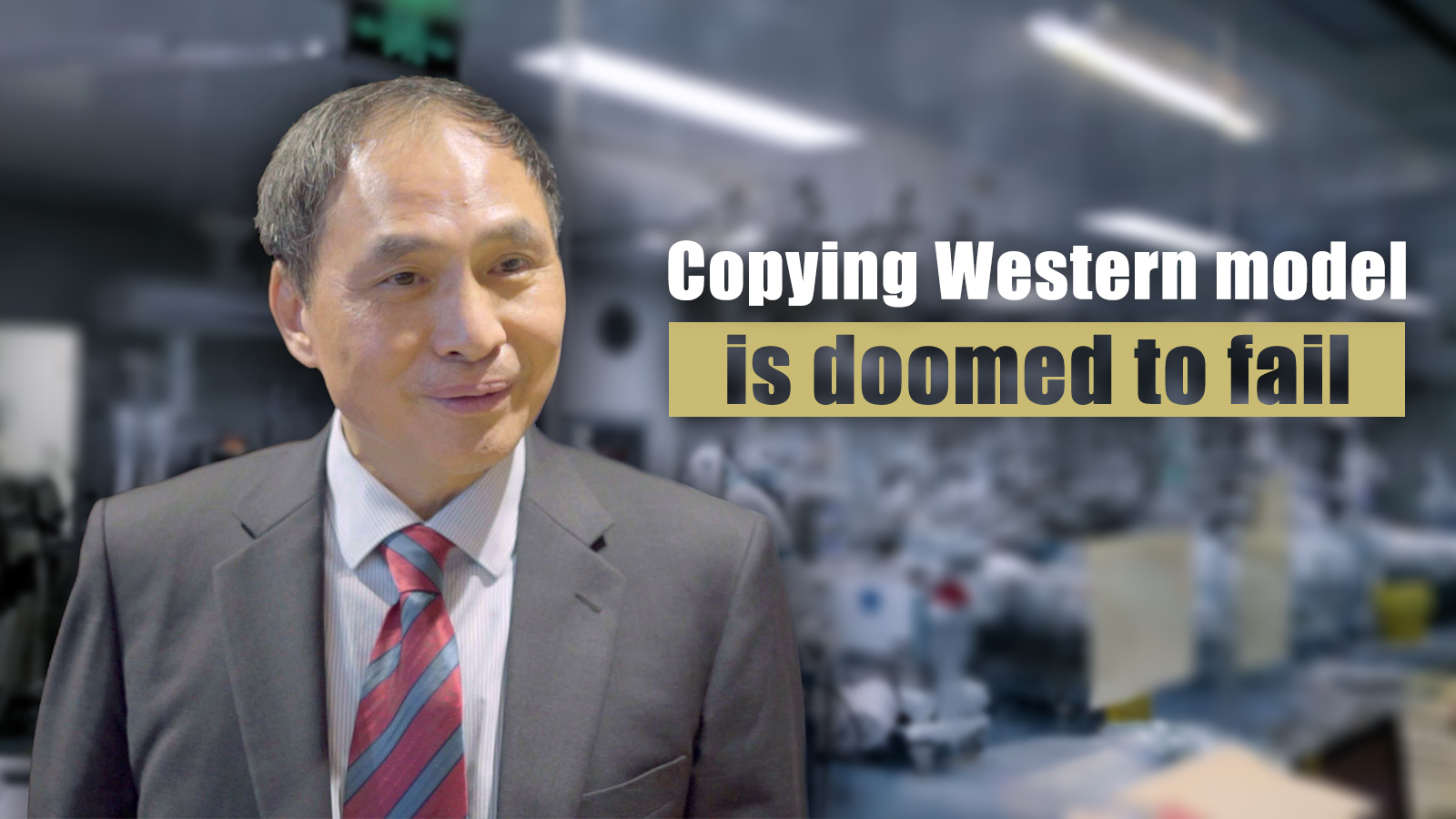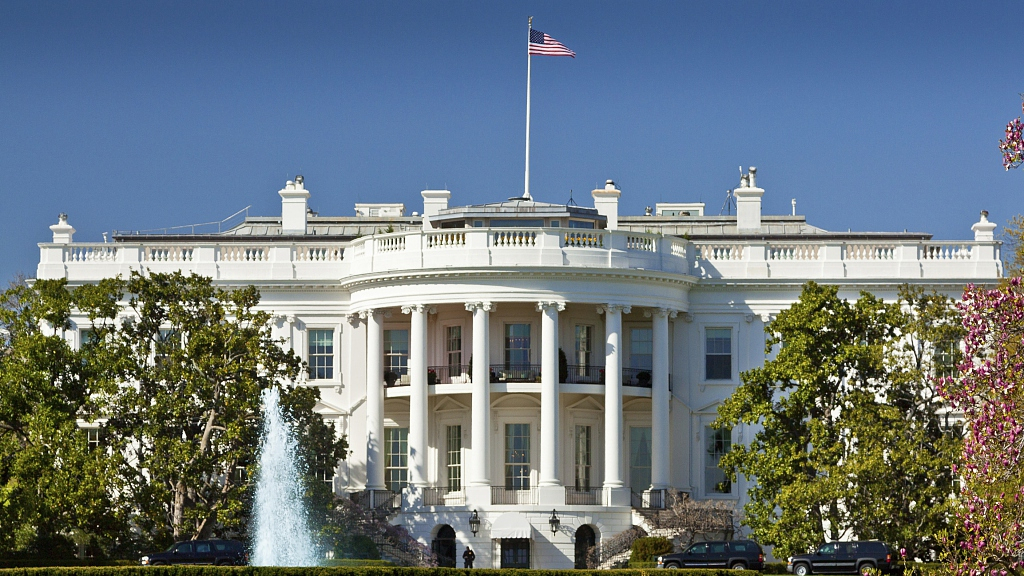03:38

Editor's note: China is mobilizing the whole society to combat the COVID-19. What are the challenges in this fight? Why are some Westerners obstinate in anti-China sentiments? How will this affect China-West relations? What's the solution? CGTN's Liu Jianxi talked with Zheng Yongnian, professor at the National University of Singapore and director of CCG Academic Council, on these issues. Here is the fourth part of the interview. The article reflects the expert's opinions, and not necessarily the views of CGTN.
CGTN: You said that "something has gone wrong with the West's internal order." What has gone wrong?
Zheng: The so-called capitalist order in the West remains sound in terms of economy. The West is now the most developed, especially the U.S., which is also the largest market. The West is also the leader in technological innovation capacity. Most of the original technologies are in the West.
In fact, economic recovery has been pretty well in recent years, especially for the United States. Since the 1980s, the West has been the main driver of globalization, and China has also participated in it. The West has also gained a lot in the process of globalization. In fact, I think it is the biggest beneficiary.
The main problem in the West now is with its internal distribution, which results in greater social division, widening income gaps, and a shrinking middle class that traditionally supports the operation of Western democracy. After the Second World War, in the entire West, including the U.S., the middle class once made up 70 percent of the whole society, but now the number is less than 50 percent.
The problem of the West, it's mainly a political problem. Multi-party politics is fine when the middle class is growing, for no matter which party is in power, the interests of the middle class will always be taken into account. Now, that the middle class is shrinking, nobody is satisfied.
In the past, multi-party politics could still reach a compromise with each other, but now multi-party politics has turned into a scene where opposition parties oppose for the sake of opposing.
The United States is a typical example. Before Donald Trump took office, the Democratic and Republican parties could still discuss some issues and introduce some effective policies, but now the two parties are complete rivals.
Just look at what happened when Trump gave his State of the Union address this time, and you will see how far antagonism between Trump and Pelosi has gone. It is clear that the main problem in the West is not the economy. The economy is still vibrant. The problems are mainly political.
I think their major problems are similar to those in the late Qing Dynasty in China: things have already gone wrong with the political system, but they still think their political system is the best. Many have seen that there are many problems in the Western democratic system and the multi-party system, but who is going to fix them?
This requires an effective government. But now, if their multiple parties oppose each other, it will be very difficult to have an effective government. Although the economy remains strong, capitalists are relatively scattered rather than being in a group.
This problem can only be solved through politics and an effective government, but they cannot give rise to an effective government. Therefore, this is still a major challenge for the next administration of the West. They should also deal with political reforms. If the reforms do not go well, it will be a headache.
05:25

CGTN: What does Western "liberal order" mean to non-Western countries?
Zheng:It's hard to solve the problems of a Western democracy within itself, but it is easy to turn these problems into external issues, which can easily lead to war. This is true today.
The U.S. blames China for its trade deficits, but it doesn't solve the problems of the U.S. at all. Its problems will always be there, despite the signing of phase one agreement. Even when the bilateral trade is balanced between China and the U.S., the problems of the U.S. will remain.
Problems such as a shrinking middle class and unfair distribution of wealth and income are solely the problems of the U.S. itself and have little to do with China-U.S. relations, at least not in an important way.
What the U.S. needs to do is to carry out internal reforms, but if it fails to do so and turns its attention to foreign policy or China-U.S. relations, it would damage the relations.
History has proven that the internal problems of a country cannot be solved either through colonialism, imperialism, or war. The right way is to carry out internal reforms.
In this era of globalization, it is a fact that developed and developing countries or countries in the North and the South are learning from each other, mainly to improve their political and other systems, rather than turning themselves into another country.
Indeed, China is learning from the U.S. because there are many good aspects to learn from the U.S., but we don't do it because we want to become another United States; we just want to make China better.
Since the launch of its reform and opening-up policy, China has been learning from the U.S. and other Western countries as well as Japan and Singapore with an open mind while building its system.
In recent years, China's success also had a far-reaching influence in many developing countries. China is not only getting more like itself, but it's getting better and better, creating much discussion about China's development model.
With its increasing influence, China's development model has also been criticized by some anti-China forces in the West. At the 56th Munich Security Conference, U.S. House Speaker Nancy Pelosi said that China is seeking to export its digital autocracy through Huawei. This is a misunderstanding about China.
Fu Ying, Vice-Chairperson of the Foreign Affairs Committee of the National People's Congress of China, responded, "1G, 2G, 3G, 4G – all the technology came from Western countries, from the developed world, and China has maintained its political system. It is not threatened by these technologies. Is the democratic system so fragile that it could be threatened by a single high-tech company like Huawei?"
Every system has its strengths and weaknesses. All strengths inspire us to learn. Although some Americans are hostile to China, they should not stop China from learning from the United States' strengths. China is doing so because it wants to be better, rather than becoming another United States.
That's impossible. So I think developing countries need to be rational. After the Second World War, experiences in many countries have proven that copying other countries' political systems is bound to fail. At that time, many countries in Asia, Africa, and Latin America copied the Western system, but none of them succeeded. Only countries that chose independence succeeded.
After the Second World War, the U.S. spent a lot of money on promoting Western-style democracy and freedom. In the past decade, for example, George W. Bush implemented the Greater Middle East Initiative, and the U.S. also promoted its democracy in Afghanistan, Pakistan, and some Middle East countries which then carried out color revolutions.
But none of these moves succeeded. So, I think developing countries need to think rationally about what kind of path they should pursue. It is vital for them to choose a development path that is in line with their national conditions, culture, and history.
Copying the Western political system is bound to fail. Developing countries should stay the course and keep their heads cool rather than copying others' models. Copying definitely leads to failure.
Read more:
COVID-19 fight is scientific not political
Is racism on the rise in the West?
'Clash of civilizations' theory is a tool to stir clashes
(If you want to contribute and have specific expertise, please contact us at opinions@cgtn.com.)